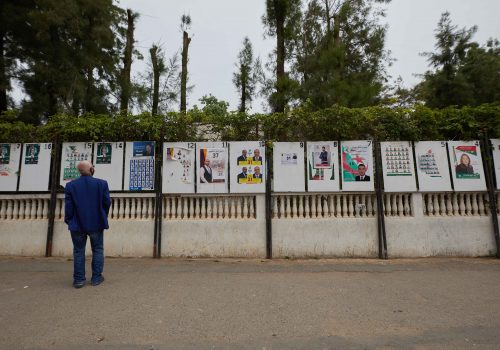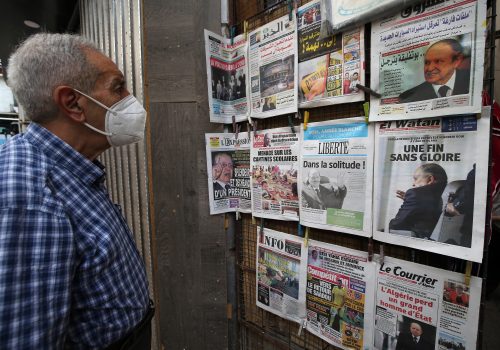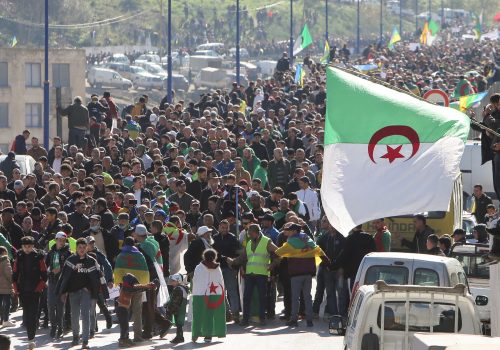Algeria’s fate is tied to the Ukraine crisis. Will a war extinguish hope for the country’s popular movement?
With international attention concentrated for weeks on Russian forces amassed at Ukraine’s borders, fewer resources have been spent anticipating the many second- and third-order effects that conflict between these two countries could trigger worldwide.
In light of its recent history, Algeria is one country whose fate could swing substantially based on Russia’s actions in eastern Europe.
Three years ago, Algeria witnessed the emergence of a historic peaceful protest movement, known as the Hirak. Beginning on February 22, 2019, millions of ordinary citizens took to the streets to protest the decision by ailing four-term President Abdelaziz Bouteflika to seek a fifth term in office.
Caught off guard by the mass mobilization, Algeria’s powerful military leaders withdrew their support for Bouteflika, obliging him to resign (Bouteflika passed away in September 2021). Alongside the lurching transition process that followed, leaders also oversaw a purge of rivals within the ranks of the political and business elite.
Satisfied with these shakeups or wary that further protest might induce a return to the violence Algeria witnessed in the 1990s, many Algerians went home, even as others continued to demonstrate for more fundamental reforms. Protesters paused their marches when the coronavirus pandemic began in 2020, then restarted them a year ago on the movement’s second anniversary.
New levels of repression
That pause gave authorities an opportunity to regroup.
Last spring, renewed protests were met with more aggressive police tactics, alleged torture of detainees, and a reinforced ban on public demonstrations. Through extensive abuse of limits on pre-trial detention, the insertion of vague new clauses into the country’s penal code (imposed by presidential decree during a parliamentary recess), and a judiciary firmly under the executive’s mantle, authorities succeeded in silencing many of the loudest proponents of reform.
Several hundred political prisoners are now jailed on vague charges such as “undermining national unity,” often for mere social media posts. Also targeted were civic organizations like Rassemblement Action Jeunesse (officially dissolved in October 2021) and SOS Bab El Oued (whose leader was sentenced to prison on spurious charges in November 2021). Of the few opposition political parties still active in the country, several also faced threats of dissolution or saw their leaders imprisoned. Similarly, numerous independent journalists were arrested and sentenced for reporting on protests or other sensitive topics.
Amid this overwhelming repression, street demonstrations dropped off nationwide by June 2021 and haven’t resumed since.
Feeling the pain
Algerian authorities portrayed this crackdown as a clean-up of would-be agents of instability, but truly destabilizing forces actually struck in the months that followed.
Possessing the Maghreb region’s lowest vaccination rates, Algeria suffered its worst months of the pandemic in summer 2021. Citizens scrambled to find scarce oxygen supplies. Meanwhile, wildfires raged in Kabylie and other eastern regions, killing dozens of civilians as well as soldiers sent to battle the blazes without proper equipment. Alongside fires, drought forced water cuts throughout the country. Moreover, according to European Union (EU) statistics and anecdotal accounts, illegal migration from Algeria to Europe reached record highs.
Grasping for scapegoats, Algeria sought to blame its domestic troubles on neighbor and rival Morocco, with which it severed diplomatic relations in August 2021. Unsurprisingly, that move failed to resolve the country’s domestic challenges. By fall, inflation was nearing double-digits, with consumer goods, especially food staples, hit hardest. Authorities blamed “speculators” and adopted legislation to further expand their oversight of prices and supply chains.
The crackdown, diplomatic spats, and policy moves lent an impression of increasing desperation among Algeria’s leaders: beset by mounting catastrophes, surrounded by foes, and dangerous to anyone who crossed them.
By year’s end, multiple economic warning lights were flashing. Oil and gas receipts, the mainstay of Algeria’s rentier economy, rose last year after the pandemic-induced shock of 2020, but ballooning local energy consumption and persistently high import bills continued to eat away at the country’s dwindling savings.
In response, Bouteflika’s successor, President Abdelmadjid Tebboune, signed a finance law in late December 2021 that imposed new taxes on some imports and stripped back staple food and energy subsidies for all but the poorest Algerians (previously, the subsidy regime cost some $17 billion annually).
But, on February 13, barely six weeks after signing the finance law, Tebboune rolled back its central tax and subsidy changes in a startling—albeit welcome one to many Algerians, who had chafed at the price shifts—policy reversal.
Markets on the move
After so recently appearing cornered, Algeria’s leaders now projected confidence. What changed in the last few weeks to embolden them again?
Rising odds of a Russian invasion of Ukraine have contributed to a steep jump in oil prices, which are now nearing $100 a barrel (up fivefold from their pandemic low). Were it to invade Ukraine, Russia, which is Europe’s largest supplier of both oil and gas, would quickly be isolated by Western sanctions, likely pushing global energy prices higher still. In that case, many expect that Algeria stands to reap a windfall.
Algeria already delivers oil and gas to nearby European markets, notably accounting for around 8 percent of total EU gas imports. Much of this supply flows via established undersea pipelines, leading many to suggest that Algeria could quickly ramp up production to help compensate for a sudden cut-off of Russian supply (Western diplomats have already been pressing active foreign gas producers in Algeria about this possibility).
On the surface, Algeria appears poised to expand capacity; this year alone, state producer Sonatrach has announced plans to resume operations in Libya, partner with Russia’s Gazprom in developing major new deposits, and begin its own off-shore exploration.
Some speculate, however, that because of its longstanding ties to Russia, Algeria won’t rush to save Europe. Such hesitation is improbable. Algeria clearly needs the revenues and pursuing them is unlikely to jeopardize its more enduring links to Russia (where it has made three-quarters of its military purchases for decades).
More so than political will, technical capacity may limit Algeria’s ability to increase output rapidly. Algeria’s hydrocarbons sector has witnessed years of underinvestment and inconsistent management (Sonatrach has cycled through seven CEOs in the past decade). Foreign operators in Algeria regularly complain of burdensome red tape, unfavorable financial conditions, and aging infrastructure. Until they materialize, promises of expanded production are best viewed as mere promises. The recent announcement that Sonatrach would finally begin off-shore exploration was the same one it made in 2015.
A year to remember?
If 2021’s catastrophes made it a year most Algerians and their leaders would rather forget entirely, 2022 holds new promise. The year marks the sixtieth anniversary of Algeria’s independence from France. Algerian leaders won’t miss the opportunity to rouse patriotic fervor and reinforce their legitimacy. Geopolitical realities may also substantially boost oil and gas revenues entering government coffers, even despite potential output constraints. Those revenues would enable the state to continue efforts to meet Algerians’ basic needs and, beyond that, to buy social peace.
However, if, events in Ukraine do increase Europe’s reliance on Algerian energy supplies, it must not be taken as a signal to leaders in Algiers that they may continue or broaden abuses with impunity.
Algeria’s leaders would like nothing more than to bury the now-dormant Hirak for good. Already, official public criticism of last year’s mounting crackdown was notably more muted than in years past (though international watchdogs like Human Rights Watch, Amnesty International, and the United Nation’s human rights commissioner continue to report on violations). Few foreign governments have publicly questioned the situation of Algeria’s hundreds of political prisoners, forty of whom launched a hunger strike late last month, which authorities have denied is even taking place while illegally transferring striking detainees. Meanwhile, Algerian activist coalitions like Nida-22 have gone silent amid the crackdown.
Western governments must not allow shifting energy markets to diminish calls for human rights and the rule of law. A better course would be to sever oil and gas negotiations from humanitarian concerns, as many Western powers have sought to do with China. Besides energy fees, Europe still holds many cards that can entice Algeria to adjust its course. More frequent public statements on human rights developments (both positive and negative) can be paired, for example, with discussions on expanded trade (particularly in foodstuffs), development of water management infrastructure, an enhanced role for Algeria in resolving crises in Libya and the Sahel, or expanded travel and education opportunities for Algerians. France, which has still never apologized for colonial-era atrocities and which plays a vital role in the ongoing Western Sahara stalemate, has particularly substantial leverage.
Creative, principled diplomacy can ensure that, as Algeria’s engagement with the US, Europe, and the world evolves, our humanitarian responsibilities to its citizens aren’t forgotten.
Andrew G. Farrand is a nonresident senior fellow with the Atlantic Council’s Middle East Programs. He is the author of The Algerian Dream: Youth and the Quest for Dignity.
Further reading
Thu, Jun 3, 2021
Algeria’s parliamentary elections: A bumpy road ahead
MENASource By
While the coronavirus pandemic put on hold the Hirak movement, its resumption in February this year indicates that many Algerians have not renounced challenging the Algerian government.
Wed, Sep 22, 2021
Mourned by some, cursed by others, former President Bouteflika left Algeria ill-prepared for the future
MENASource By Andrew G. Farrand
Abdelaziz Bouteflika's death is unlikely to substantially shift the country's trajectory, in large part because of just how rigid a system he and his generation of independence heroes already imposed upon Algeria during their lifetimes.
Tue, Feb 16, 2021
Two years on, Algeria’s Hirak is poised for a rebirth
MENASource By
Partisans of the Hirak are quick to point out that they voluntarily paused the movement and can restart it at any time. Two years after the Hirak’s eruption, that possibility appears likely.
Image: Government-Walis meeting, at the Palais des Nations at the Club des Pins, in Algiers, Algeria on September 25, 2021, under the theme "Economic recovery, regional balance, social justice" (Photo by Billal Bensalem/NurPhoto)


